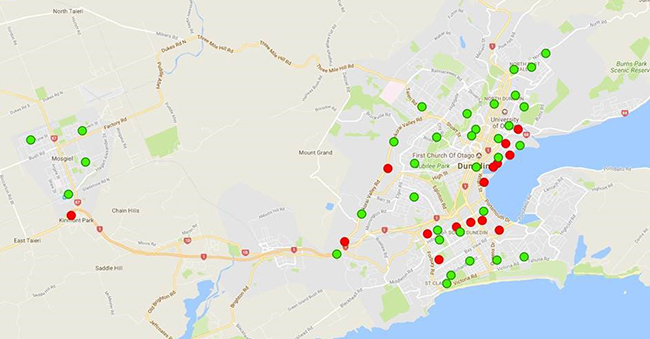Mudtanks are designed to collect surface water from the road, footpath, kerb and channel and transfer it to a piped stormwater system or watercourse.
Mud tank testing
Mud tank waste is being tested for asbestos, following test results that showed low-risk levels of asbestos at the Green Island Landfill.
As a precaution, the Dunedin City Council is testing mud tank waste and cleaning procedures have been adjusted to make sure contractors and the public are kept safe.
Initial test results show the presence of some level of asbestos in a third of the 49 tanks sampled. Further testing is being done to determine the level of asbestos and related risk.
The DCC has taken advice from an independent expert and believes there is no significant risk to the general public.
The asbestos risk is believed to be very low, but as a precaution to ensure contractor safety, a number of measures were put in place as soon as the issue was identified. It is not expected this will cause any issues, as audits have shown 97 percent of mud tanks were clean.
Contractors are wearing protective equipment when cleaning mud tanks and the DCC is working with them to ensure they are following safe procedures, including proper cleaning and disposal techniques for any clothing and equipment used while cleaning mud tanks.
FAQs
Should I be concerned?
No. Asbestos is safe when it’s wet, and we believe there is no significant risk to the public from the asbestos in mud tank waste. The precautions we’re taking will keep contractors and the public safe when mud tanks are being cleaned.
What are you doing about this?
As soon as we identified the potential issue, we started testing mud tank waste and put safety precautions in place. Initial test results show the presence of asbestos in a third of the 49 tanks sampled. Further testing is underway to determine the level of asbestos and related risk. The results so far show low levels of asbestos.
Contractors have changed their procedures due to the asbestos.
How long has this been an issue?
Low risk levels of asbestos were identified at two sites in the restricted part of the Green Island Landfill in March 2018. Testing and precautions were put in place immediately.
How many mud tanks have been tested and where?
We tested 49 mud tanks across the city. The map below shows the sites that were tested and those that had asbestos present.

What exactly do the test results show?
Initial test results showed the presence of asbestos in 15 of the 49 tanks tested. We are doing more testing to get a clearer picture of the levels of asbestos. Results so far show low levels.
Do other cities have similar problems?
We weren’t previously aware of any asbestos in the mud tanks as it’s not usually tested for. We’re letting other New Zealand councils know so they can check their own systems. We expect other cities may have the same issue, as asbestos has historically been a widely used material.
Is my drinking water safe?
Yes, stormwater and drinking water are completely separate systems.
What is the cause of the asbestos in the mud tanks?
We don’t know the exact cause, but in the past asbestos was a common building material and has been used in some vehicle brake pads and linings. It’s likely that small amounts from these sources have accumulated in some mud tanks.
What will happen if we get heavy rain or flooding?
There is no change to the risk in heavy rain or flooding. It is not expected to cause any issues as audits have shown 97% of tanks were clean. Mud tanks are still being monitored and routinely cleaned.
Where can I find more information?
For information about what the DCC is doing, please call us on 477 4000. If you would like to know more about the health effects of asbestos, you can get in touch with Public Health South.
